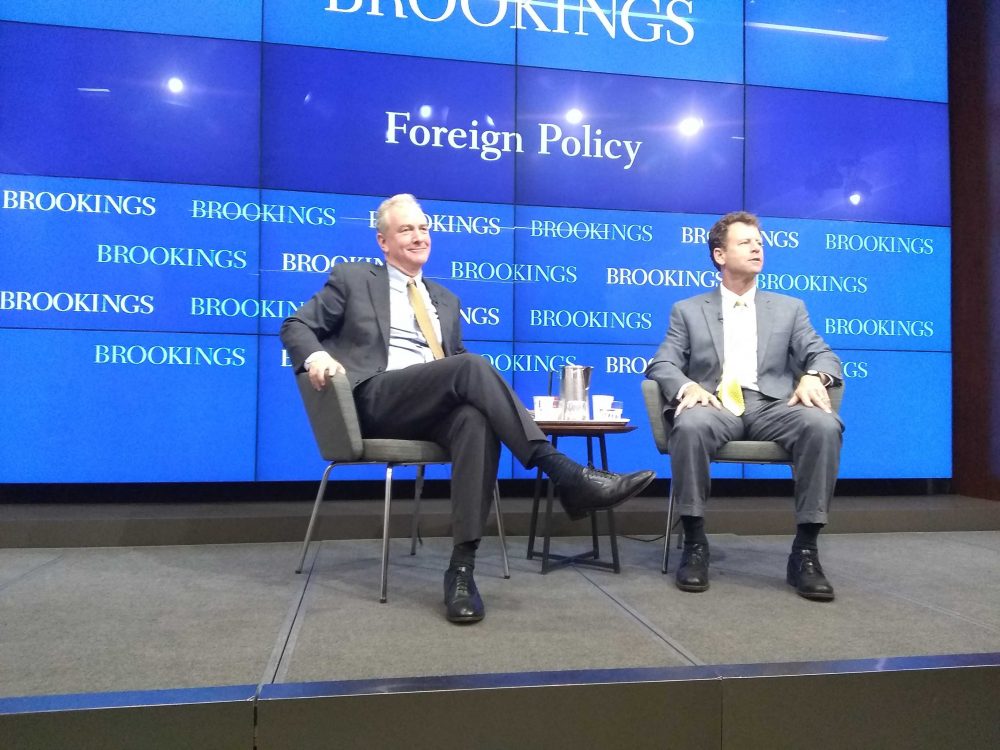WASHINGTON – Sen. Chris Van Hollen, D-Maryland, criticized what he called the Trump administration’s isolationist foreign policy and called for greater collaboration with American allies in a discussion on defense and international affairs at the Brookings Institution Thursday.
Van Hollen said that after the United States pulled military support for a longtime ally, the Syrian Kurds, and allowed Turkish forces to invade their homeland unopposed, “we essentially drove everybody into Russia’s hands.”
The senator said he supported economic burden-sharing among America’s allies in longstanding defense treaties, but decried President Donald Trump’s approach as one that “undermines our credibility.”
Trump defended the military’s withdrawal from Syria in remarks at the White House Oct. 23, saying, “As a candidate for president, I made clear that we needed a new approach to American foreign policy – one guided not by ideology, but by experience, history, and a realistic understanding of the world.”
The U.S. retreat from the world stage under Trump comes amid political and economic posturing from two rivals, Russia and China, Brookings senior fellow and discussion moderator Michael O’Hanlon said.
In 2014, Russia annexed Crimea, a peninsula with a large ethnic Russian population that had been part of Ukraine since the fall of the Soviet Union in 1991. The invasion was met with swift international outcry and economic sanctions.
According to broad consensus in the U.S. intelligence community, Russia was also responsible for widespread interference in the American presidential elections of 2016.
China, meanwhile, has the world’s second largest GDP – $13.6 trillion, compared to $20.4 trillion in 2018 for the United States, according to data from the World Bank.
The east Asian nation also has the world’s largest population, with 1.4 billion citizens, and a nuclear arsenal of 300 warheads, O’Hanlon said.
Both Russia and China needed to be dealt with forcefully, in conjunction with American allies, Van Hollen said.
“Sen. Marco Rubio (R-Florida) and I introduced the DETER Act, which would impose sanctions on Russia for election meddling,” he said. The measure, according to a Van Hollen statement, “mandates a set of severe sanctions” within 30 days of the director of national intelligence’s conclusion that Russia interfered in an American federal election.
Despite Russia’s cyber attacks and regional bluster, Van Hollen said he doubts it will take further action in Ukraine, instead citing China as “our main area of competition going forward.”
He said there was no U.S. company involved with radio for emerging 5G cell phone networks, and that American research and development needed improvement.
And in a rare instance of agreement with the administration, Van Hollen said he backed Trump’s decision to enforce a Federal Communications Commission blacklist of Chinese cell phone manufacturer Huawei, which has been banned from U.S. networks since May.
The firm has faced widespread scrutiny in the United States since 2012, when the House Intelligence Committee issued a report that said Huawei “cannot be trusted to be free of foreign state influence.” The Justice Department in January unsealed 23 charges, including intellectual property theft against Huawei.
“Our strategy with China should be working with our Eruopean allies,” Van Hollen said. “We should be engaged in a lot of quiet diplomacy.”
He also said the Trump administration’s retreat from the Iran nuclear deal and cozying up to North Korean leader Kim Jong Un left much to be desired.
Van Hollen said Trump’s withdrawal from the Iran agreement negotiated under the Obama administration “strengthen(ed) the hard-liners in Iran,” adding that “we should go back to (the agreement),” but immediately begin talks to extend it.
And Trump’s photo ops with North Korea’s leader “elevated (him) on the world stage,” Van Hollen said, because “Kim Jong Un loves the spotlight.”
But in the end, only tough sanctions will bring the rogue nation to the negotiating table and help achieve the long-term goal of North Korean denuclearization, he said.

